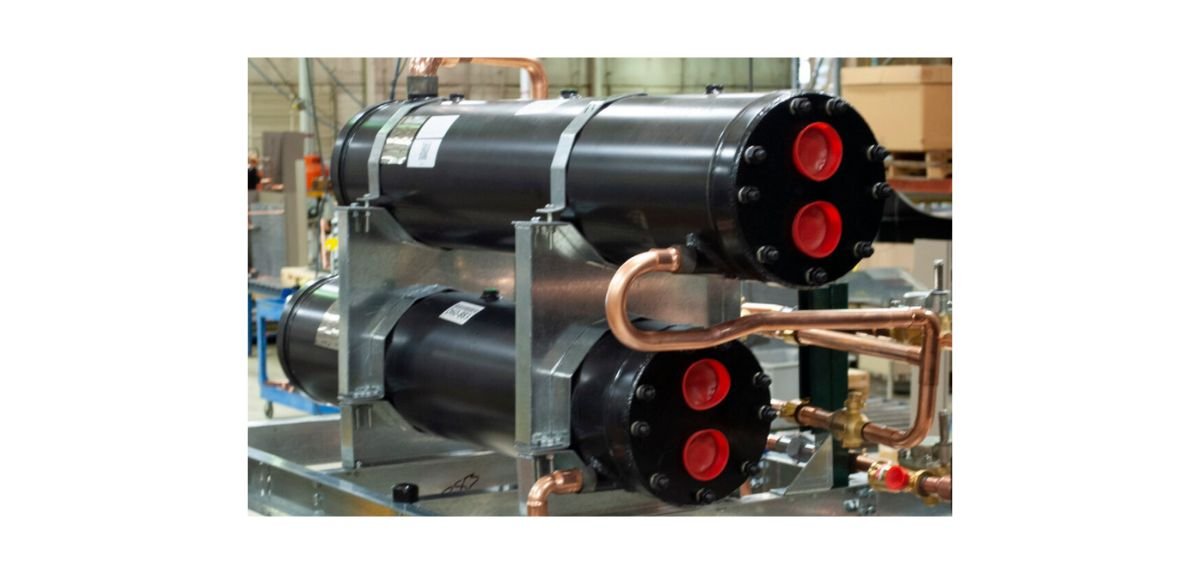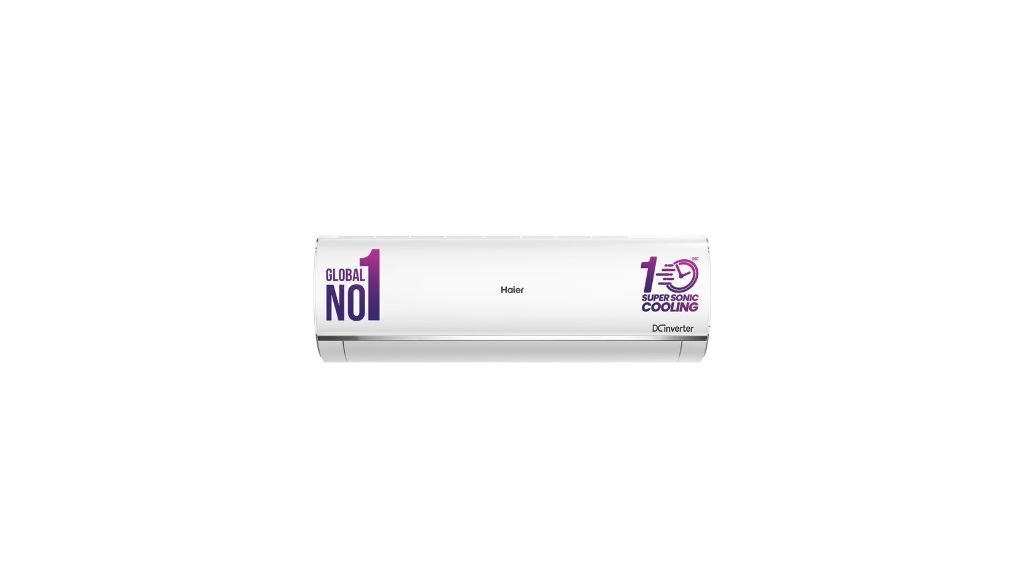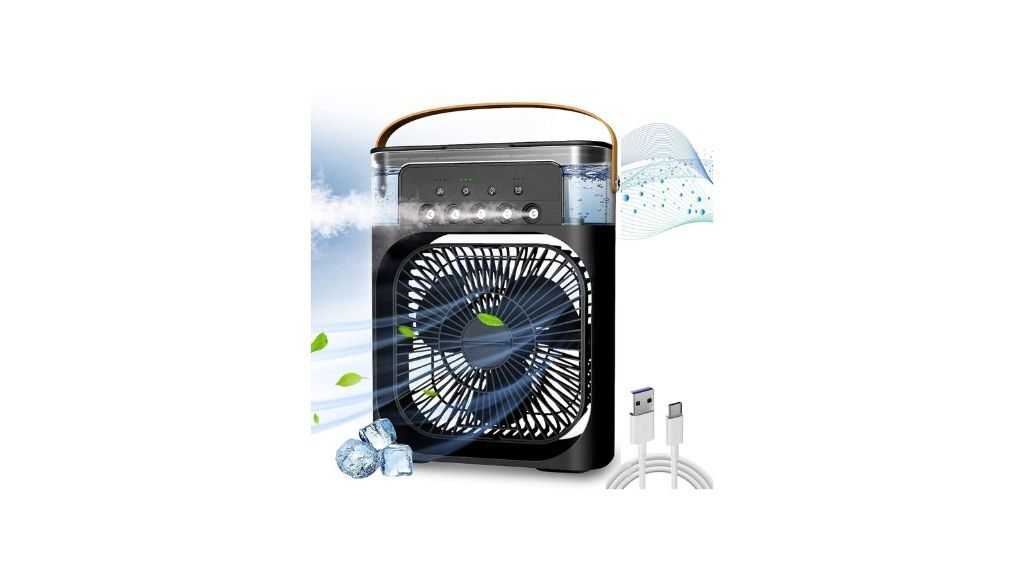
A condenser is an equipment that supports various devices to work well. It is used in refrigerators, air conditioners, and thermal power plants. In the refrigerator, it cools the refrigerant vapor. This is a heat exchanger that transforms the matter state, vapor into liquid by removing the heat. Let’s come to discuss the types of condensers and their functions.
There are most significant types are air-cooled, water and evaporative condensers:
Air-cooled condenser:

They use ambient air to disperse heat from the refrigerant. It is made up of a coil of refrigerant tubing that is surrounded by aluminum fins and a fan that promotes heat transfer by blowing air over the coil. They are often used in small commercial and residential refrigerant systems and air conditioning units.
Pros:
- Compact and low maintenance
- Easy to install
- Water supply is not required
- Energy efficient in suitable weather
Cons:
- Low performance in high temperature
- Less effective in humid conditions
Water-cooled condenser:

This condenser is used for transferring the heat from refrigerant to water. It cooled the cooling tower before the use. They are formed by a shell and tube or a plate. Where refrigerant streams through the tubes. Due to its paramount efficiency, it is used in heavy commercial and industrial systems such as office buildings and factories.
Advantages:
- Higher efficiency
- Better performance even in heavy load.
Disadvantages:
- Need a constant water source and cooling.
- High cost in maintenance and installation
Evaporative condenser:

It combines both concepts of air and water cooling. By contacting water and air, refrigerants are cooled and condensed. This system evaporates and enhances the cooling effect on the refrigerant. Its requirement is in large-scale industrial systems and cooling towers. Where insides replenish the large quantity of heat efficiently.
Advantage:
- High efficiency.
- Efficient in immediate changes of temperature.
Disadvantages:
- It needed constant water supply and maintenance.
- This is a very complex
Shell and Tube condenser:
This highly efficient Shell and Tube contain a series of tubes inserted in a large shell. In Refrigerant, a cooling medium vapor flows the inner tube and water into the outer tube and transfers the heat via the tube wall. It found in high-capacity industrial refrigeration and power generation systems; this condenser is suitable for applications where is required of resilience and efficiency.
Advantages:
- Handle large capacity and pressure.
- Flexible design.
Disadvantages:
- Costly to manufacture and install
- Need regular maintenance and tube cleaning to ensure efficiency.
plate condenser:
Multiple thin plates are stacked together and create a channel for the refrigerant and cooling fluid. Where cooling medium flows through the channels, exchange the heat efficiently, causing a large surface area of the plates. This is suited to small refrigeration systems, food processing applications and HVAC systems.
Advantages:
- Heat exchanger efficiency
- Compact design.
- Easy to maintain and clean compared to tube design.
Disadvantages :
- Limited capacity.
- More expensive
Top 10 Brand of Condenser:
Trane: Trane condensers are known for their durability and efficiency and are a leading manufacturer brand of HVAC systems, components and condensers. They provide advanced technology and energy efficiency in their products.
Carrier: A renowned brand for reliability, performance and energy efficiency, and also a trusted choice for HVAC systems. They are frontiersmen in the air conditioning industry.
Lennox: Lennox meets different needs and provides innovative heating and cooling solutions. It reduces the energy consumption and enhances the comfort due to its design.
Goodman: Goodman is considered for their reliable HVAC solutions and condensers. This popular brand focuses on value and is liked by homeowners and contractors who are searching for good-performance condensers at a low price.
Daikin: Daikin is known for cutting-edge technology and leads globally in HVAC systems. They offer advanced condenser solutions and meet your requirements of energy consumption and eco-friendly focus.
York: York presents a variety of HVAC systems and high-performance condensers. This durable and reliable brand provides efficient solutions for both residential and commercial applications.
Mitsubishi Electric: It made the condenser that met the requirements of residential and small commercial applications. It specializes in making high-efficiency ductless and ducted systems and innovative technologies with low energy consumption.
Friedrich: This brand is popular for its air conditioning systems, window units and portable air conditioners. They focus on reliability and efficient products homes and businesses use.
Bosch: It makes a variety of heating, cooling products, and condensers. Bosch is known for its quality and energy efficiency. They commit to innovative and eco-friendly solutions.
Rheem: This is a reputed brand in the HVAC market and offers high-quality and efficient cooling solutions. These reliable and high-performance condensers are applicable in home and business places.
FAQs:
- What is the function of a condenser?
Condensed is a significant part of refrigeration, air conditioning systems and power generation. It converts vapor cooling medium into liquid by removing heat.
2. Which type of condenser is used in HVAC systems?
There are 5 types of condensers air-cooled condenser, water-cooled, evaporative, shell and Tube and plate condenser.
3. How do I choose the right type of conditions for my system?
It depends on several features including.
Application Requirements: consider the cooling load, efficiency needs, and space considerations.
Budget: It depends on your use of the device for long-term operational expenses.
Energy Efficiency: choose a high-efficiency condenser to reduce energy consumption.
Environment conditions: You have to consider the installation environment, like temperature and humidity levels to find the most suitable condenser types.
4. How to identify whether the condenser needs maintenance or replacement?
- It reduces the cooling efficiency, which is not as effective as before, which is an indication of the need for service.
- If unusual sounds are coming this is also a signal issue with the condenser components.
- If the refrigerant is leaking, it could be addressed immediately; it also affects the system’s performance.
- Somewhere visibly damaged components to repair or replacement to ensure system integrity.
Conclusion:
We have discussed the appropriate type of condensers depending on various factors, including the specific application, efficiency requirement, space constraints and budget. You can choose by considering their advantages and disadvantages. By considering top brands and their innovations, performance and commitment to energy efficiency, it helps to make an informed decision. FAQs resolve the many issues and provide essential information with the troubleshooting tips.



